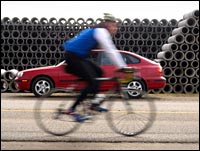Dear Brokeass,
What I’m having the worst issue with is that most of the stuff we do has such a small impact. Recycle, reuse, on and on. I know the biggest place to make an impact is transportation, but the vehicle cost has me down. I’d love a hybrid car, but when you’re strapped for cash and you need transportation to get to work/school, used hybrids in the $2,000 range just do not exist.
My small town public transit is a travishamockery [Brokeass note: I think this means “travesty/sham/mockery”] that we cannot utilize for one reason or another any way we look at it.
Aside from squirreling away funds for a car loan for $31,000, what else can you suggest? I already ride my bike in the summer season, but in Wisconsin (this winter being the exception), it gets too cold and icy for that option. Is there some company somewhere giving them away cheap that I’m unaware of? Or should I just take comfort knowing my 17-year-old Volvo gets better mileage than my neighbor’s 4-year-old SUV?
Rex Schultrich
Dear Rex,
Wisconsin, eh? What I know about Wisconsin is … cows. Could you ride one? Oh, wait, no. You’d have to put a catalytic converter on her. I guess methane isn’t all that great, either. Oh, and they’re slow. So, short of riding cows, what’s a brokeass to do?

In the interest of being fair, I’ll let you in on my biggest environmental secret. I spent four years driving an ancient Jeep Cherokee that I bought from some guy down the street for really cheap. I was nearing the 200,000-mile mark when I began to be haunted by the smell of gasoline fumes. I thought it was my conscience speaking to me, a kind of tell-tale heart pulsing beneath my proverbial floorboards. But then friends confirmed that the fumes were in fact real, and that my beater was slowly oozing gas out of its tank. My plan had been to drive the Cherokee (his name was Yoda) until I could afford a hybrid, maybe after I graduated from college and started making money. And now that I have realized the former but not the latter, the hybrid remains but a magical dream, and instead I put Yoda up for sale and moved to a city with public transit.
I wish I could say that public transit is the solution to all our woes, but in most parts of the U.S., it simply doesn’t cut it. When and where you can, ride the bus (since in theory supporting public transit will improve it), carpool, bike, or walk. But when those options simply don’t seem possible, there are some other ideas out there.
What about car-sharing? A leading option is Flexcar, though the closest one to Wisconsin is in Chicago. But Flexcar can cost you as low as $8 an hour, and if you join this month, they’re offering a special one-year membership fee waiver. There are other business-y and grassroots car-sharing programs out there, and a quick web search yields a program called Community Car right there in Wisconsin — though since I don’t know what town you call home, I can’t tell if it’s anywhere near you.
Sharing your personal car (or other people’s cars) is another good way to cut back on environmental impacts and costs. Programs like Ridester, eRideShare, and RideshareOnline are several options, and I’ve also tried Craigslist‘s rideshare, and I haven’t been kidnapped or maimed so far. If strangers freak you out, try starting up your own carpool network with people you already know, or even find some friends who are willing to share a car.
You could also consider buying a diesel car and running it on biodiesel. Older diesel autos probably have a better chance of falling in your price range, and though biofuels have their own problems, it’s a great option as we figure out how to go oil-free. Pretty much any old diesel engine can run on biodiesel, or can be souped up to run on straight veggie oil, but you can see lists of cars here and here.
Or what about a flex-fuel car? Since 1998 or so, some vehicle manufacturers have been creating cars that can run on E85, a blend of 85 percent ethanol and 15 percent gasoline. Something like 4 million cars on the road in the United States right now are compatible with E85, and more automakers are making new flex-fuel vehicles every year. There’s a decent chance that with some searching, you could find a used flex-fuel vehicle. You can even use flex-fuel to beef up the environmental stature of any gasoline-powered car, since most can run on 10-percent-ethanol/90-percent-gasoline blends. Right next door to the Badger State, Minnesota has even signed a law requiring that all gasoline sold there is of that balance.
And though owning a hybrid seems out of the reach of most of us, the good news is that Toyota at least is planning to offer some low- to no-interest financing options on the Prius. Another bit of sunshine: Despite the overwhelming upfront costs, hybrids are probably cheaper in the long run.
In the meantime, the best policy if you’re broke and absolutely need a car is to get the most fuel-efficient vehicle you can on your budget, keep it well-maintained, and use it as little as possible. And if you have to use it, share. Everyone likes people who share.
Concerned about the environment but don’t have the economic means to buy your way to carbon neutrality? Need some ideas on how to be savvy about the earth and your dollar? Direct your questions, comments, and ideas to . And remember, as the old saying goes, it’s better to be broke than to further the break-up of the Arctic ice shelf.

